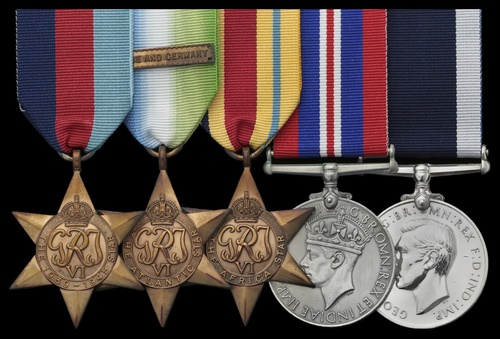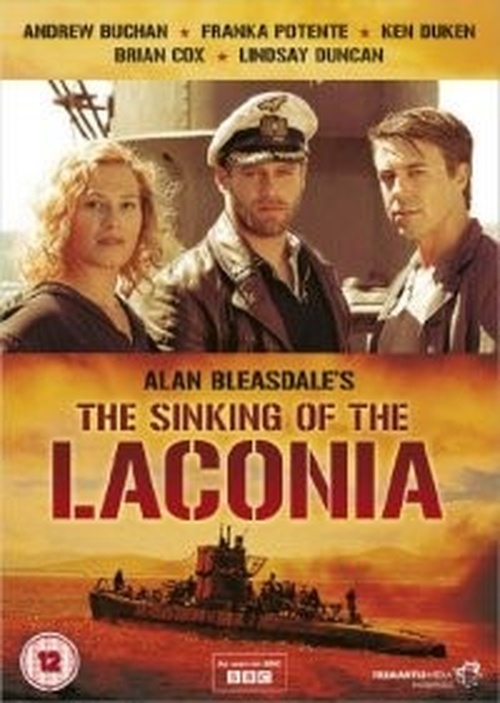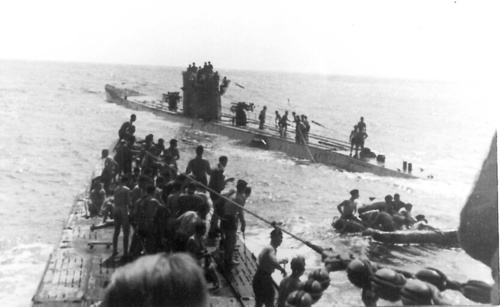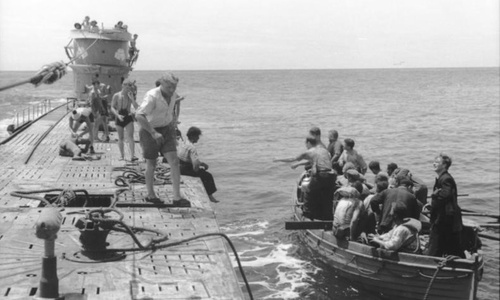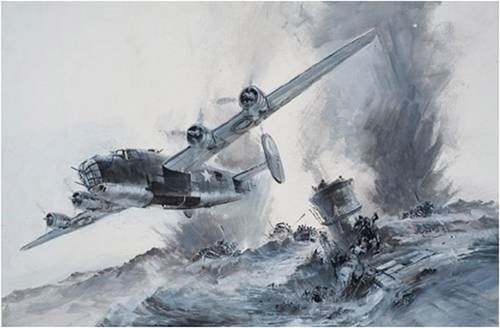Auction: 22003 - Orders, Decorations and Medals
Lot: 404
12 SEPTEMBER 1942: THE "LACONIA" INCIDENT
A Second World War campaign group of five awarded to Mechanician 1st Class E. L. England, Royal Navy, who survived the loss of the troopship Laconia on 12 September 1942, when she was torpedoed by the U-156 600 miles off West Africa
The immediate aftermath of the attack witnessed scenes of total chaos, when, amidst pitch darkness and deafening screams, women and children fell to their deaths from the stricken ex-Cunarder; those who reached the water were then subjected to shocking attacks by sharks and barracuda
However, for those who got away in Laconia's lifeboats, help was at hand, for on surfacing and discovering the presence of numerous Italian P.O.W.s, the U-156's commander opted to pursue a remarkable rescue mission: he embarked Laconia's women and children and, with the assistance of two other U-boats and an Italian submarine, commenced towing the lifeboats towards the West African coast
Sadly, his good intentions were swiftly curtailed on the fourth day, when U-156 was attacked by an American B-24 Bomber and further casualties inflicted on Laconia's survivors: mercifully, however, the Vichy French cruiser Gloire was on her way from Dakar and duly managed to gather up most of Laconia's survivors
The 'Laconia incident' - as it became known - had serious repercussions, for Admiral Donitz immediately issued his Triton Null order, thereby prohibiting U-boats from attempting further rescues
1939-45 Star; Atlantic Star, clasp, France and Germany; Africa Star; War Medal 1939-45; Royal Navy L.S. & G.C., G.VI.R., 1st issue (KX. 78576 E. L. England, Mech. 1, H.M.S. Drake), light contact marks, good very fine and better (5)
Evan Llewellyn England was born in Padstow, Cornwall on 27 November 1898 and entered the Royal Navy as a Stoker 2nd Class in August 1927.
Appointed a Mechanician 2nd Class in H.M.S. Valiant on the outbreak of hostilities in September 1939, he remained similarly employed until coming ashore to the Alexandria naval base Nile in September 1941.
In the interim, Valiant participated in Operation "Catapult", the attack on the French Fleet at Mers-el-Kebir. Subsequently transferred to the Mediterranean, she was present at the battle of Cape Matapan in March 1941, in addition to the withdrawal from Crete, where she was struck by two bombs.
The "Laconia" Incident
Of Evan England's next appointment - after Nile in September 1941 - there is no extant information, but his service record notes that he was 'interned at Medouiana (ex-Laconia)' and later still 'safe in the U.S.A.'. Medouiana - or Medina - was in Dakar, Senegal and this would suggest he was liberated from the Vichy French by an American unit after the allied landings in North Africa, and thence embarked for the States.
A fellow Royal Naval rating who undertook a similar journey was Geoffrey Greet, whose obituary was published in The Daily Telegraph following his death in June 1921, aged 101. Following the allied landings in North Africa, 'he walked out his prison camp and hitched a ride to the U.S. in a cutter, and from there to Greenock in the Dutch liner Niuew Amsterdam.'
An extensive feature recalling the 'Laconia Incident' was written by Annabel Venning at the time of BBC 2's release of a related two-part film in January 2011; it was published on the The Daily Mail's website in the same month.
Containing, as it does, a deeply moving account of the human aspect of the disaster, set within the wider picture and its resultant repercussions, her article is quoted here in full:
'On the bridge of the Laconia, Captain Rudolph Sharp watched the sun set over the western horizon. The Atlantic Ocean stretched out before him in all its vast, empty beauty. But beneath the waves, he knew killers were lurking.
Aboard his ship, once a luxury Cunard liner, now converted to a troopship, were 2,700 people, mostly Italian prisoners of war guarded by Polish troops, along with dozens of injured British soldiers and other military personnel and 87 women and children - mainly families of servicemen.
The ship was shabby and in dire need of maintenance. Its hull was festooned in barnacles that slowed it down, and its funnel belched black smoke which was visible for miles.
Captain Sharp was painfully aware that his vessel, sailing without a convoy and with only a few guns, was highly vulnerable to a U-boat attack.
But many of the passengers, relieved to be going home, had begun to relax, despite the regular lifeboat drills.
In the cabin she shared with her parents and ten-year-old brother, Alec, 14-year-old Josephine Frame was climbing onto the top bunk as her parents were leaving the cabin to go to a dance in the ballroom upstairs.
Suddenly there was, she remembers, 'a horrendous noise. Then a deathly silence'. The ship rocked violently. Then another terrible explosion and the ship began listing to its starboard side.
The Laconia had been struck by two torpedoes, one at 8.07pm, the other 30 seconds later. They had been fired by a German submarine, U-156, part of a U-boat wolf pack hunting for Allied ships.
Hitler was determined to prevent the build-up of men and munitions in Britain that would enable the Allies to invade Occupied Europe. His U-boat captains had orders to sink any ships carrying troops or armaments.
Captain Werner Hartenstein of U-156 had sighted the Laconia earlier that day. A U-boat ace, he had already sunk just short of 100,000 tonnes of Allied shipping during the war. By sinking the 20,000-tonne Laconia, he would reach that total, making him eligible for the German military award, the Ritterkreuz.
But the events of the coming days were to prove that Captain Hartenstein was far from a ruthless Nazi killing machine. Indeed, in one of the most extraordinary episodes of World War II, he was about to emerge as a very unlikely hero.
The story of the Laconia incident, as it became known, has been made into a drama, as well as a documentary … It portrays some German submariners, not as the callous monsters of British wartime propaganda, but as courageous, humane men whose behaviour contrasted starkly with that of some of our allies.
For the remaining survivors of that terrible night, the events remain painfully clear nearly 70 years on.
Josephine Frame (now Pratchett, a retired teacher living in Northamptonshire), recalls the panic when the ship was hit.
'It was carnage. People were screaming, there were bodies everywhere. The ship was listing so badly they could not get the lifeboats clear of the side at first.'
Josephine watched in horror as another family tried to get into another lifeboat with their three young sons.
'As Mrs. Lindsay put the baby into the boat, it tipped over. The baby fell into the sea and was drowned. Mrs. Lindsay was screaming, it was terrible.'
Women and children were given priority in the lifeboats. Many of the men jumped off the side of the ship, some injuring themselves badly.
Down in the hold, where the two torpedoes had struck, hundreds of Italian PoWs were killed instantly. Others struggled to escape as water poured in. As they came on deck, Polish and British soldiers held them back from the lifeboats at bayonet point.
Doris Hawkins, a nursing sister, had been looking after a 14-month-old baby girl for her parents. She finally found a place in the lifeboat only for it to capsize just as the baby was handed to her.
'I lost her,' Doris wrote afterwards. 'I did not hear her cry even then, and I am sure that God took her immediately to Himself without suffering. I never saw her again.'
Some of the lifeboats were launched in such haste that the bungs for the drain holes had not been inserted, so they filled with water and sank.
The ship's officers left the Laconia last. Those who survived the leap into the sea clung to debris, and watched the Laconia's stern rear out of the water before she sank below the waves with a hiss and a roar. Captain Sharp went down with his ship.
Next came another terrifying explosion as the Laconia's boilers burst, covering the sea, and everyone in it, with oil.
Soon, ominous black shapes began to join the survivors in the water, attracted by the smell of blood: screams rent the air as sharks and barracuda began to attack the living and dead.
Then, came the unmistakable rumble of a U-boat's engine - terrifying for those still clinging to life, as Allied propaganda had depicted U-boat commanders as Nazi fanatics who would machine-gun survivors in the water.
Hitler himself had decreed: 'Since foreign seamen cannot be taken prisoner .?.?. the U-boats are to surface after torpedoing and shoot up the lifeboats.'
Instead, the Laconia survivors' fear turned to amazement as they saw the Germans on the U-boat's deck begin dragging victims from the water.
Hearing the cries of the Italians, Hartenstein assumed he had just torpedoed a ship full of Germany's allies - then he saw with horror that women and children were among the survivors. So he decided to rescue everyone, regardless of nationality.
Soon the entire deck of the submarine was crowded with men, women and children.
They were taken below, given dry clothes, warm tea and bread.
To ease the overcrowding on the tiny submarine, the unharmed men were put back into the lifeboats, which were then tied together or lashed to the U-boat with lifelines.
All that night and the following day, Hartenstein's men worked tirelessly, pulling people from the sea and shepherding the flotilla of lifeboats and rafts.
Doris Hawkins had endured a terrible 24 hours since the Laconia had sunk. After losing the baby, Sally, she had been hauled aboard a life raft to which she, along with nine men, clung all night - shivering with cold.
The following day, they had drifted beneath the fierce tropical sun, their skin blistering painfully, their limbs swollen by saltwater and their throats burning with thirst. By the time they were spotted by the U-boat that evening, one man had already died.
They were taken on board and treated with 'great kindness and respect', the German officers giving up their bunks to the exhausted survivors.
To her joy, she found on board a friend she had made on the Laconia, Mary, the wife of an Army officer based in Egypt, who was going home to see her two young sons. What Doris did not know was that Mary was pregnant with another child, by her lover, a Fleet Air Arm Lieutenant, Peter Medhurst, also travelling on the ship.
Onboard U-156, there were now 193 survivors and a further 200 in the lifeboats that clung to it. Approximately 1,100 other survivors floated in lifeboats nearby.
Hartenstein had radioed U-boat command, shortly after picking up the first survivors, informing them of the presence of the Italian PoWs and asking for instructions.
Admiral Donitz, head of the German U-boat fleet, ordered two other submarines in the area to assist the rescue and the Italian navy sent its nearest submarine. Vichy France - ostensibly neutral but largely pro-Axis - also sent three ships from a naval base in North Africa.
But Hartenstein knew that Allied shipping, or planes, might sight his U-boat and attack it, unaware of who was on board. He needed the survivors to be rescued.
He therefore took an unprecedented step. Using an open radio frequency he broadcast a message in English: 'If any ship will assist the wrecked Laconia crew, I will not attack her, provided I am not attacked by ship or aircraft. I have picked up 193 men.' He then gave his co-ordinates, signing off: 'German submarine.'
If any British listening stations in Africa picked up this offer of ceasefire, there is no record of it. It is possible that it was heard, but dismissed as a trick. If it was intercepted, then no one thought to pass it on to Ascension Island 250 miles away, the site of a secret American airfield where planes could refuel mid-Atlantic.
The Americans were merely told that the Laconia had sunk and that two British ships were being sent to look for survivors. They were requested to provide air cover, but no mention was made of Hartenstein's rescue or his ceasefire offer. So American planes began combing the Atlantic for U-boats, primed to attack them.
Meanwhile, the rescue continued. Josephine Frame and her family had been floating in a lifeboat awash with blood and vomit for four appalling days, surrounded by dead bodies and sharks, before the U-156 found them.
They staggered on board, stupefied with exhaustion and sunburn. But their salvation was all too brief.
On Wednesday, September 16, Captain Hartenstein [of the U-156] saw an American B-24 bomber approaching. Assuming the plane was part of a rescue effort, his crew spread out a large Red Cross flag on the deck, and signalled their peaceful intentions with lamp and morse code.
Unfortunately, the pilot, Lieutenant James Harden, didn't understand the signals. He radioed back to Ascension Island to report what he had seen and ask for orders. Airfield commander Captain Robert Richardson deliberated. Though the ship was flying a Red Cross flag, it was an enemy submarine and therefore a danger both to the airfield and to Allied shipping. He gave the order: 'Sink the sub.'
Back on the U-156 passengers and crew watched the bomber curiously, then with horror as the bomb doors opened and two bombs were released. They both missed, but Harden returned for a second and then a third attempt. Several lifeboats were hit, killing dozens. The U-boat was slightly damaged.
Hartenstein had no choice but to save his submarine, so he ordered the 93 Laconia survivors overboard. They jumped into the shark-infested waters and swam for the remaining lifeboats as U-156 headed away from the danger zone.
Fortunately, just hours later the Vichy French ships arrived and picked up most of the survivors and took them to Dakar, West Africa, from where they were sent to internment camps.
Josephine Frame and her family ended up in an internment camp near Casablanca: 'It was pretty awful; dysentery was rife. But it was wonderful to be back on dry land.
But in the confusion, the French ships had missed two of the lifeboats. Lifeboat 9, with 68 people on board including Doris Hawkins, Mary and Peter Medhurst, was left to row for the African coast, 600 miles away.
By the time it reached land 27 days, later, 16 people had died, including Mary and her lover Peter, who, after she passed away, slipped overboard into the sea. The other lifeboat was discovered by a British trawler after 40 days at sea. Only four of its 52 occupants were alive. Altogether, of the 2,725 passengers that had embarked from Cape Town, only 1,500 had survived the tragedy.
The repercussions of the Laconia incident were far-reaching. On September 17, the day after the bombing of U-156, Admiral Donitz sent a message to all U-boat commanders that became known as the Laconia Order, forbidding any attempt to help survivors of sunken ships.'
Subsequent career
Having made his way back from the U.S.A. in the interim, Evan England was awarded his L.S. & G.C. Medal whilst based at the shore establishment Drake in June 1943.
Moreover, he was appointed a Temporary Warrant Mechanician in the Royal Naval Volunteer Reserve in June 1945.
Subject to 20% VAT on Buyer’s Premium. For more information please view Terms and Conditions for Buyers.
Sold for
£300
Starting price
£160

